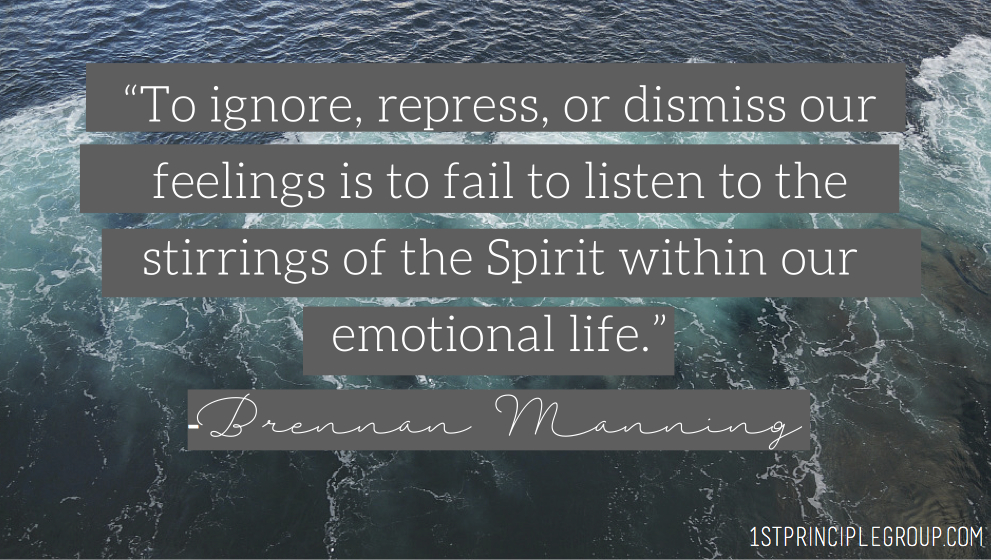Understanding your Emotions
 Growing up in a house full of women, I have often been labeled as a ‘softy.’ I’ll be the first to admit that I do feel things deeply, but I really can work hard to hide the fact that the Dove soap commercial about Mother’s Day made me feel emotions…
I am also highly analytical - so when anything happens, I want to understand it immediately, file it in its own section where it makes sense, and then work off the data I’ve gained from it to make a decision. There have been a handful of times when these wires seem to get crossed. I'll feel like I’m making a decision based on emotions that don’t really make sense and they are out of left field. Have you ever been there? It’s confusing and isolating and embarrassing all at once.
Growing up in a house full of women, I have often been labeled as a ‘softy.’ I’ll be the first to admit that I do feel things deeply, but I really can work hard to hide the fact that the Dove soap commercial about Mother’s Day made me feel emotions…
I am also highly analytical - so when anything happens, I want to understand it immediately, file it in its own section where it makes sense, and then work off the data I’ve gained from it to make a decision. There have been a handful of times when these wires seem to get crossed. I'll feel like I’m making a decision based on emotions that don’t really make sense and they are out of left field. Have you ever been there? It’s confusing and isolating and embarrassing all at once.
We can be tempted to believe that the mere fact that we are feeling emotions is what’s wrong. Why am I feeling this? I can’t believe I just felt that. We judge the emotion before really exploring where it came and why it came at that moment.
We slowly train ourselves to validate certain emotions as ‘correct’ and others as ‘wrong.’ This pattern creates a problem. We do not allow ourselves to fully experience and understand the range of emotions we were created to feel. Yes, you may have a problem with anger that has developed from years of unprocessed, hidden sin...but what if you never allow yourself to discover the root of some of that anger? What if it is something that you should have been angry about this whole time?
What if the gauges we use to process these emotions are incorrect?
I’m not a pilot, but I’ve been in enough planes to appreciate that my pilots have very accurate instruments and gauges that tell them everything. I’ve also heard stories of what it’s like to fly when these gauges are not accurate. It’s possible but dangerous. It’s possible for you to experience your emotions with inaccurate gauges, but it’s dangerous. You might never really know where you are.
I have a faulty gauge that I have lived with for most of my life. It reveals how people think of me and how worthy I am. There have been times when it has been reading more accurately, and I feel comfortable with who I am, who my friends are, and what people say about me. More often than not, it’s reading in all sorts of crazy directions. I have entered a social situation, looking at this gauge that reads, “These people don’t think highly of you.” And I immediately made a decision to do something else to be liked.
It’s a simple example, but can you sense how foolish it is for me to make that decision based on a gauge that has no real bearing on where I actually am? How did I know those people didn’t like me? Even if they didn’t, what difference does it make with who I am as a person?
Being Honest with our Emotions
I don’t think this is as simple as saying “Look at emotions in the Bible - just feel those!” That can leave us still judging certain emotions as ‘sinful’ before we truly understand them at their roots. The Bible is our absolute gauge for who we are in Christ - we know what is true about ourselves based on what God says about us. But, we also have to contend with real emotions that come from deep within us. Emotions that don’t necessarily make sense, that don’t fit into a well-defined box of Christian living, emotions that we push away or hide, but emotions that never seem to leave us.
When I work with people, I always smile when I can here someone judging a feeling before they have fully understood it. It often sounds like this: “It made me really mad, but it’s not a big deal.” I like asking people on a scale of 1-10 how much they believe that statement and how true it is. If they truthfully know that it is not a big deal, but they don’t believe it...we have a gauge that is off. They know that their anger is maybe not warranted (truth), but if they are not willing to acknowledge that they still intensely feel that anger some days (belief), there cannot be progress. We know what’s true, but we believe something else.
There are all kinds of fine lines here that I should probably be careful to walk, but I want to make sure I’m clear on this one: I’m not suggesting we listen to every emotion, and I’m not suggesting every emotion is right. But until we stop to reflect on where the emotions are coming from and what we are feeling rather than what we think we are supposed to feel, I don’t believe we can move forward in health.
How can you work to understand your emotions without immediately judging them this week?
